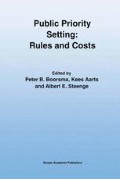Abstract
The authority of the state in a constitutional democracy is never self-evident. The state can only claim obedience of its citizens if the authority of the state is morally justified from the point of view of the citizens.1 In this moral justification of authority exists the essence of the concept of legitimacy. To be considered legitimate the actions of the state (public administration) have to meet a number of normative standards. National as well as local government (the municipalities) have to meet normative standards which can be derived from the concept of the constitutional state.2 One of these standards is the principle of legality (rule of law). This contribution however concentrates on the principle of separation of powers.
Access this chapter
Tax calculation will be finalised at checkout
Purchases are for personal use only
Preview
Unable to display preview. Download preview PDF.
References
Albrow, M. (1971), Bureaucratie: een begripsanalyse, Universitaire Pers, Rotterdam.
Bovens, M.A.P. (1995), Ambtelijke verantwoordelijkheid, IN: P. de Jong e.a., Verantwoordelijkheid en verantwoording in het openbaar bestuur, VUGA, Den Haag, pp. 133–144.
Denters, S.A.H., H.M. de Jong and J.J.A. Thomassen (1990), Kwaliteit van gemeenten, VUGA, Den Haag.
Denters, S.A.H. and H.M. de Jong (1992), Tussen burger en bestuur, Universiteit Twente, Enschede.
Depla, P. (1995), Technologie en de vernieuwing van de lokale democratie, VUGA, Den Haag.
Derksen, W. (1992), De gemeente als gemeenschap, VUGA, Den Haag.
Derksen, W. and A.F.A. Korsten (1995), Local government: A survey, IN: W.J.M. Kickert and F.A. van Vught (eds.), Public policy and administration sciences in the Netherlands, Prentice Hall, London, pp. 63–85.
Fischer, F. (1980), Politics, values and public policy: The problem of methodology, CO: Westview, Boulder.
Fischer, F. (1985), Critical evaluation of public policy: A methodological case-study, paper presented on IPSA-congress, Paris.
Green, L. (1990), The authority of the state, Clarendon Press, Oxford.
Herweijer, M. (1990), Macht en onmacht bij de toepassing van het bestuursrecht, Kluwer, Deventer.
Heuvel, J.H.J. van den, and M.S. de Vries (1996), De inrichting van de ombudsranctie op lokaal bestuursniveau, in: Bestuurswetenschappen 2, pp. 100–116.
Hillebrand, R. (1995), Lokale referenda van de tweede generatie, in: S.A.H. Denters, H.M. de Jong, R.J.P. Schobben en G.H. Reussing (eds.), Decentrale democratie, Universiteit Twente, Enschede, pp. 11–31.
Hoogerwerf, A. (1995), Politiek als evenwichtskunst: Dilemma’s rond overheid en markt, Samsom H.D. Tjeenk Willink, Alphen aan den Rijn.
Idenburg, Ph.A. and H.R. van der Loo (1995), Governing the welfare system: Dynamics and change, in: W.J.M. Kickert and F.A. van Vught (eds.), Public policy and administration sciences in the Netherlands, Prentice Hall, London, pp. 319–338.
Jong, H.M. de (1989), Norm en feit in de gemeente, Universiteit Twente, Enschede.
Jong, H.M. de (1992), Twijfel en verantwoordelijkheid in net recht, Universiteit Twente, Enschede.
Krogt, T.P.W.M. van der, P.B. Boorsma, J.W. van Deth and D.W.P Ruiter (1987), Big is beautiful?: Schaalveranderingen in overheid en samenleving, VUGA, Den Haag.
Linde, H.J.L. van der (1995), Lokale democratie en referendum, in: Denters e.a., Decentrale democratie, Universiteit Twente, Enschede, pp. 33–40.
Lucardie, A.P.M. (1985), Politieke parnjen, IN: Andeweg e.a. (eds.), Politiek in Nederland, Samsom H.D. Tjeenk Willink, Alphen aan den Rijn, pp. 63–80.
Pennen, A.W. van der e.a. (1995), Welzijnsbeleid in de lokale samenleving, VUGA/SCP, Den Haag/Rijswijk.
Reussing, G.H. (1996), Politiek-ambtelijke betrekkingen en net beginsel van de machtenscheiding, Twente University Press, Enschede.
Rohr, J.A. (1986), To run a constitution: The legitimacy of the administrative state, University Press, Kansas.
Scheltema, M. (1989), Juridische grenzen aan de overdracht, in: H.R. Heikema van der Kloet e.a. (eds.), Wie Beslist?, Kluwer, Deventer, pp. 21–31.
Tops, P.W. (1995), De wethouder van buiten de raad, in: S.A.H. Denters e.a. (eds.), Decentrale democratie, Universiteit Twente, Enschede, pp. 57–71.
Tuurenhout, M.E. (1992), Parlementaire controle en ambtelijke verantwoordelijkheid, Gouda Quint, Arnhem.
Twist, M.J.W. van, and E.F. ten Heuvelhof (1995), Een rekenkamer op lokaal niveau, in: S.A.H. Denters, e.a. (eds.), Decentrale democratie, Universiteit Twente, Enschede, pp. 73–84.
Veldheer, V. (1996), Van planmatig naar onderhandelend bestuur, in: P.A.J. Hulsen and G.H. Reussing (eds.), Keuzen maken: Nederland tussen 1976 en 1996, Twente University Press, Enschede, pp. 107–126.
Voerman, G. (1994), Politiek zonder partijen?: Over de horizon van de partijpolitiek, Het Spinhuis, Amsterdam.
Vroom, C.W. (1980), Bureaucratie: Het veelzijdig instrument van de macht, Samsom Uitgeverij, Alphen aan den Rijn.
Weber, M. (1922), Wirtschaft und Gesellschaft, J.C.B. Mohr, Tübingen.
Author information
Authors and Affiliations
Editor information
Editors and Affiliations
Rights and permissions
Copyright information
© 1997 Kluwer Academic Publishers
About this chapter
Cite this chapter
Reussing, R. (1997). Political-Administrative Relations and Separation of Powers. In: Boorsma, P.B., Aarts, K., Steenge, A.E. (eds) Public Priority Setting: Rules and Costs. Springer, Dordrecht. https://doi.org/10.1007/978-94-009-1487-2_14
Download citation
DOI: https://doi.org/10.1007/978-94-009-1487-2_14
Publisher Name: Springer, Dordrecht
Print ISBN: 978-94-010-7165-9
Online ISBN: 978-94-009-1487-2
eBook Packages: Springer Book Archive

